Banknotes of the Brazilian cruzado
In 1986 because of inflation banknotes of the cruzado were issued by Central Bank of Brazil in denominations of 10, 50, 100, 500, 1000, 5000 and 10 000 cruzados. This bank had the sole authority to issue cruzado notes and Casa da Moeda do Brasil was the sole printer of these banknotes.[1]: 29–35 Cruzado notes on the front/obverse featured prominent people while on the back/reverse depicted buildings and/or activities of those people mentioned before. Between 1989 and 1990 cruzado currency had also been replaced, this time by cruzado novo at a rate of 1 cruzado to 1000 cruzados novos.
| cruzado brasileira (Portuguese) | |
|---|---|
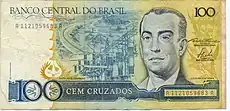 100 cruzados banknote | |
| ISO 4217 | |
| Code | BRC |
| Unit | |
| Plural | cruzados |
| Symbol | Cz$ |
| Denominations | |
| Banknotes | 10, 50, 100, 500, 1000, 5000, 10 000 Cz$ |
| Demographics | |
| Date of introduction | 28 February 1986 |
| Replaced | cruzeiro (second) |
| Replaced by | cruzado novo |
| User(s) | |
| Issuance | |
| Central bank | Central Bank of Brazil |
| Website | www |
| Printer | Casa da Moeda do Brasil |
| Website | www |
| Valuation | |
| Inflation | 147%(1986) 228%(1987) 629%(1988) |
| Source | IMF International Financial Statistics (IFS) |
| Value | 1 cruzado at 1000 cruzeiros |
Banknotes dimension 154 x 74 mm | |
History
The name cruzado was inspired by the name of an old Portuguese silver coin, which had value of 400/480 réis and that circulated in the time in which Brazil was still a colony of Portugal.[2][3]
On 28 February 1986 cruzado currency was created by José Sarney, the 31st president of Brazil, when Dilson Funaro was the minister of Finance, through Cruzado plan as part of a set of economic measures to freeze wages and prices. It was marked by return of centavo as a subdivision of the currency, since it had been abolished in 1984, due to devaluation of the cruzeiro (second).[4]
Cruzeiro (second) with cruzado overstamp
Cruzado replaced cruzeiro (second) at a rate of 1 cruzado to 1000 cruzeiros. From 28 February 1986 on 10 000 cruzeiros notes with face of Ruy Barbosa, 50 000 cruzeiros notes with face of Oswaldo Cruz and 100 000 cruzeiros notes with face of Juscelino Kubitschek were reused with only on front/obverse round-shaped overstamps of value 10, 50 and 100 cruzados.[1]: 29–30 All these banknotes were 154 x 74 mm in size and consisted of series year 1986.[5]
| Pick nr | Image | Value | Description | First issue |
|---|---|---|---|---|
| 206 | 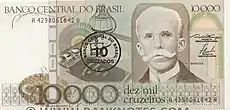 |
Cz$10 | Front 10 000 cruzeiros banknote overstamped with a value of 10 cruzados. | 28 February 1986 |
| 207 | 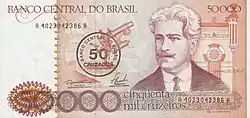 |
Cz$50 | Front 50 000 cruzeiros banknote overstamped with a value of 50 cruzados. | 28 February 1986 |
| 208 | 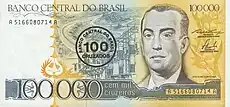 |
Cz$100 | Front 100 000 cruzeiros banknote overstamped with a value of 100 cruzados. | 28 February 1986 |
Cruzado
In October 1986 started the distribution of cruzado banknotes in a new standard. These banknotes had only replaced caption and face value of 10, 50 and 100 cruzados. New 500 cruzados notes with face of Heitor Villa-Lobos were also released in October 1986. New 1000 cruzados banknotes with face of Machado de Assis were issued in 1987. While new 5000 cruzados notes with face of Candido Portinari and new 10 000 cruzados notes with face of Carlos Chagas were released in 1988, and these would become the last banknotes of this monetary standard.[1]: 31–34 Cruzado currency was represented by symbol Cz$ and had code ISO 4217 BRC.[6] All cruzados banknotes were 154 x 74 mm in size and were withdrawn from circulation throughout the 1990.[5]
| Pick nr | Image | Value | Description | First issue |
|---|---|---|---|---|
| 209 | 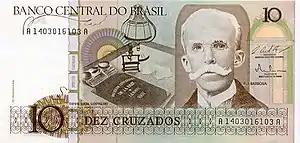 |
Cz$10 | Front; Ruy Barbosa de Oliveira Diplomat, writer, jurist and politician. |
October 1986 |
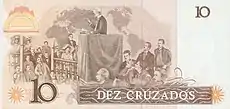 |
Back; 2nd convention signed at The Hague on 18 October 1907. | |||
| 210 | 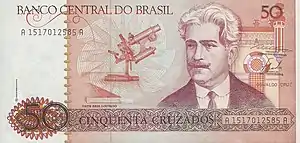 |
Cz$50 | Front; Oswaldo Gonçalves Cruz Physician, pioneer bacteriologist, epidemiologist and public health officer. |
October 1986 |
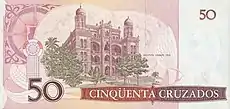 |
Back; Neo-Moorish Palace of Manguinhos in Rio de Janeiro, seat of Oswaldo Cruz Foundation. | |||
| 211 |  |
Cz$100 | Front; Juscelino Kubitschek 21st president of Brazil, initiator behind building Brasilia. |
October 1986 |
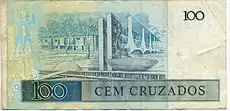 |
Back; Buildings of Brasilia, National Congress, "Catetinho" and Alvorado Palace. | |||
| 212 | 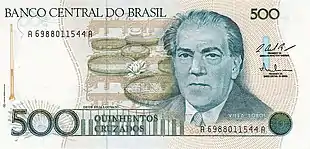 |
Cz$500 | Front; Heitor Villa-Lobos Composer, conductor, cellist, pianist and guitarist. |
October 1986 |
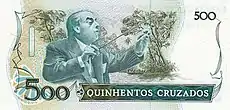 |
Back; Heitor Villa-Lobos as a conductor. | |||
| 213 | 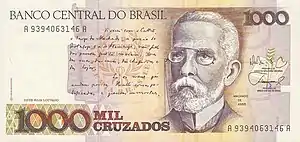 |
Cz$1000 | Front; Joaquim Maria Machado de Assis Writer of Brazilian literature. |
1987 |
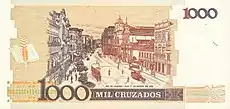 |
Back; View of 1 March street in 1905 Rio de Janeiro. | |||
| 214 | 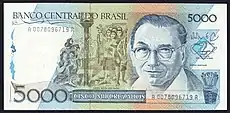 |
Cz$5000 | Front; Candido Portinari Neo-realist painter "Tiradentes" in the background. |
1988 |
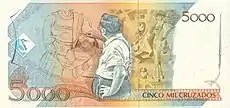 |
Back; Portinari drawing panel "Baianas" in 1953. | |||
| 215 | 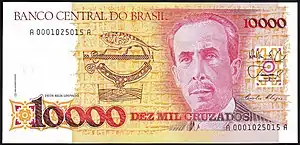 |
Cz$ 10000 |
Front; Carlos Chagas Sanitary physicien, bacteriologist. |
1988 |
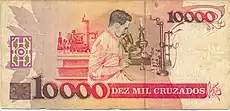 |
Back; Chagas at work in laboratory. |
Cruzado banknote not issued
There was a plan of 50 000 cruzados banknote with effigie of Carlos Drummond de Andrade to be released in 1989.[7] However it was not launched due to change of currency for cruzado novo in January 1989.
Cruzado with cruzado novo overstamp
On 15 January 1989 cruzado novo was created by José Sarney 31st president of Brazil, when Naílson da Nóbrega was minister of Finance, through Summer plan (fourth stabilization plan) which was aimed at controlling rising inflation. Inflation went from 228% in year 1987 to 629% in year 1988.[8] Cruzado novo replaced cruzado at a rate of 1 cruzado novo to 1000 cruzados, but was short-lived from 15 January 1989 until 15 March 1990 just 14 months.[9] Banknotes of 1000 cruzados with face of Machado de Assis, 5000 cruzados with face of Candido Portinari and 10 000 cruzados with face of Carlos Chagas were reused with only on front/obverse triangular overstamps of value 1, 5 and 10 cruzados novos.[1]: 34–35 All these banknote were 154 x 74 mm in size and of series year 1989.[5] Cruzado novo was represented by symbol NCz$ and had ISO 4217 BRN.[6]
| Pick nr | Image | Value | Description | First issue |
|---|---|---|---|---|
| 216 | 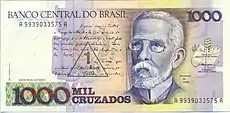 |
NCz$1 | Front; 1000 cruzados banknote overstamped with a value of 1 cruzado novo. |
15 January 1989 |
| 217 | 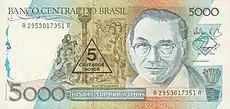 |
NCz$5 | Front; 5000 cruzados banknote overstamped with a value of 5 cruzados novos. |
15 January 1989 |
| 218 | 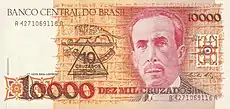 |
NCz$10 | Front; 10 000 cruzados banknote overstamped with a value of 10 cruzados novos. | 15 January 1989 |
See also
Footnotes
- Catalogo Schlichting:Cedulas Nacionais 1944 a 2016, 6 edicao 2016
- Banco Central do Brasil, Money in Brazil, December 2004, page 14, 400 réis - cruzado - prata (silver)
- Krause, Chester L (1991) Standard Catalog of World Coins:1801-1991 (19th ed.) Krause Publications. ISBN 0873411501. km453 - 400 réis - silver cruzado
- "centavo-coins, date of issue 3 March 1986". Archived from the original on 19 December 2014. Retrieved 15 January 2019.
- banknotes were 154 x 74 mm in size
- Historical currency codes
- 50 000 cruzados banknote was being held in reserve.
- The Hyperinflation in Brazil, 1980-1994
- Timeline of Brazilian economic stabilization plans, 15 March 1990 - Plano Collar.
References
- Tracey L. Schmidt (2018). "Brazil Picknr 206-218". Standard Catalog of World Paper Money: Modern Issues 1961 - present (24th ed.). Krause Publications. ISBN 9781440248597.